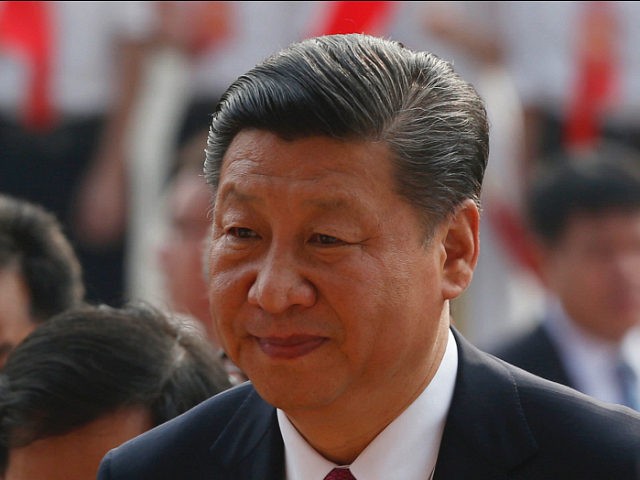China’s state-run media outlets are falling all over themselves congratulating Xi Jinping for arranging North Korea’s diplomatic opening and potentially bringing peace to the Korean Peninsula with his wise leadership.
Reporting on Xi’s Monday meeting with South Korean envoy and national security adviser Chung Eui-yong, China’s Global Times said Xi “encouraged all parties to stick to denuclearization, peace and stability in the peninsula as the fundamental tasks” — as if South Korea does not already see it that way.
The Global Times found an academic mouthpiece, research fellow Lu Chao of the Liaoning Academy of Social Sciences, to turn Chung’s message of “sincere appreciation” for China’s “important and guiding role” into a refutation of longstanding Western accusations that China wasn’t doing enough to rein in North Korea.
“Both the U.S. and South Korea have praised China for pushing the positive change in the situation, and this shows that these two countries, which used to blame China for ‘not doing enough to stop North Korea’ and refused China’s proposals, have finally understood China’s efforts and accepted China’s suggestion,” said Lu.
Lu went on to portray China as the only reason the United States has not attacked North Korea yet. He teamed up with Cheng Xiaohe of Renmin University to argue that China was actually keeping the peace by thwarting all those U.N. Security Council resolutions against North Korea because tough sanctions applied before the ones China finally agreed to permit would have hurt the North Korean people and potentially collapsed the regime.
“If North Korea collapsed due to the harsh sanctions, the situation would have been much more difficult. Problems like refugees, military conflicts and nuclear proliferation will hurt every country in the region,” Lu explained.
“There is no denying that the sanctions launched by the international community, including China, have had a serious impact on the North Korean economy and drove Pyongyang’s policies,” Cheng added.
The Global Times editorial does not explain why waiting until North Korea almost had nuclear missile technology and then clobbering it with sanctions tough enough to adjust Pyongyang’s attitude was a better idea than stopping its march to apocalyptic weapons years ago.
The Chinese paper provides this hilariously slanted account of U.S. President Donald Trump’s telephone conversation with Xi about Trump’s possible meeting with North Korean dictator Kim Jong-un:
It has been proven that Xi is right to insist on a dialogue between the US and North Korea, Trump said on the phone, adding that the US highly appreciates and values China’s significant role in resolving the Korean Peninsula issue, and is willing to strengthen communication and coordination with China over the issue.
Oddly enough, the Communist Party People’s Daily ran the exact same summary of the Trump-Xi phone call, word for word. The People’s Daily actually makes Trump sound like a more active participant in Xi Jinping’s majestic march to peace on the Korean Peninsula than the Global Times, but naturally, it comes back around to the central talking point about China’s indispensable leadership:
As a close neighbor of the Korean Peninsula and a permanent member of the UN Security Council, China has made unremitting efforts and played a unique and indispensable role in solving the Korean Peninsula nuclear issue through negotiations with a responsible attitude of safeguarding the peace and stability of the Korean Peninsula.
Signs of a thaw on the Korean Peninsula are closely related to China’s suspension-for-suspension proposal. During the Olympics, the DPRK suspended missile tests, while the US and ROK postponed their joint military drill.
The proposal, which was put forward in March 2017 to defuse the looming crisis on the Korean Peninsula, calls for the DPRK to suspend its nuclear and missile activities in exchange for the suspension of large-scale US-ROK military exercises.
That is not actually what is happening right now, as the Foal Eagle 2018 military exercise between the U.S. and South Korea was postponed for the Winter Olympics but not canceled. The U.S. has refused both Chinese and North Korean demands to cancel joint exercises permanently as a concession to restart negotiations with Pyongyang. The Olympic postponement of exercises was requested by South Korea, whose president Moon Jae-in described it as offering “an olive branch to North Korea.”
White House Press Secretary Sarah Huckabee Sanders reiterated on Monday that the Trump-Kim meeting will not happen “until we see concrete actions that match the words and rhetoric of North Korea,” by which the administration apparently means refraining from further nuclear or missile tests, but no other conditions at this time.
Former Secretary of State Rex Tillerson said on Monday that North Korea has not yet responded to Trump’s offer of a meeting with Kim, shortly before Tillerson learned that he won’t be the one taking the call if North Korea ever does respond.
China is, therefore, getting ahead of events by congratulating itself for the success of its “dual-track” or “suspension for suspension” proposal for disarming North Korea’s nukes in exchange for the United States ceasing coordination with South Korea’s military. Cynics suspect that proposal has more to do with China disliking the presence of so many advanced American military assets so close to Chinese territory than Beijing’s desire to see peace blossom on the Korean Peninsula.
It is a safe bet that after giving President Xi all the credit for making a U.S.-North Korea summit tentatively possible, Chinese media will assign him none of the blame if the talks collapse or if it turns out North Korea was never really serious about talking.

COMMENTS
Please let us know if you're having issues with commenting.